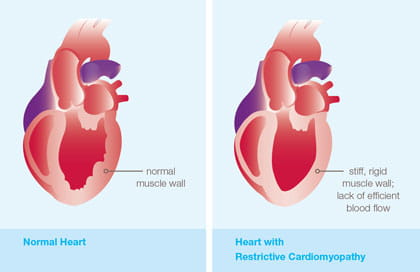The treatment for individuals with RCM can be challenging. Treatment is focused on minimizing or preventing symptoms, protecting the patient from abnormal heart rhythms and delaying disease progression.
Individuals with RCM need to be followed by a cardiologist on a regular basis. Medications are used to treat symptoms but currently there are not any medications that improve the heart’s ability to relax. The most important treatment is the prevention of abnormal heart rates, or arrhythmias.
Lifestyle changes are recommended for some individuals. Some individuals will be discouraged from exercise, especially competitive sports.
Some individuals with RCM are at increased risk for a sudden cardiac arrest. For individuals determined to be at increased risk of a sudden cardiac arrest, preventive treatments such medication to control heart rate (antiarrhythmic medications) or an implantable cardioverter defibrillator (ICD) may be recommended. If the condition is severe, a heart transplant may be considered.




